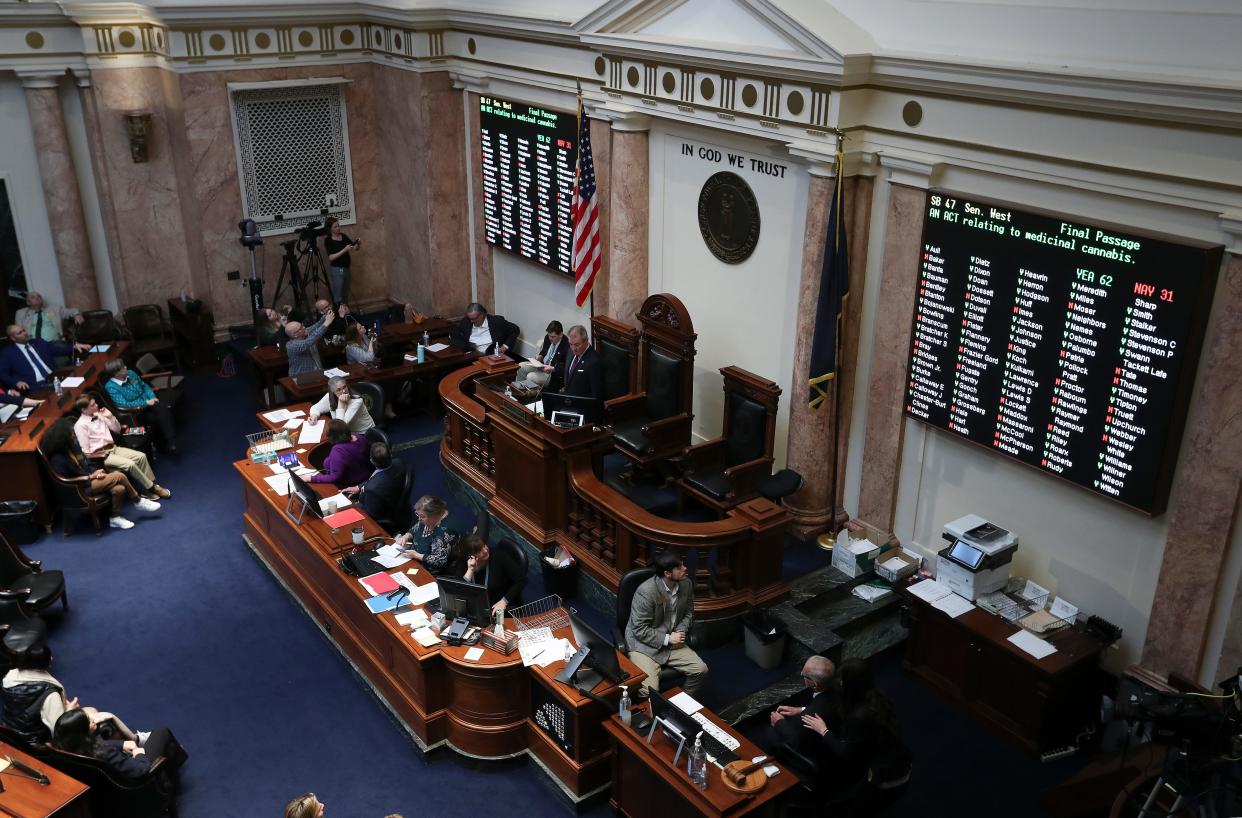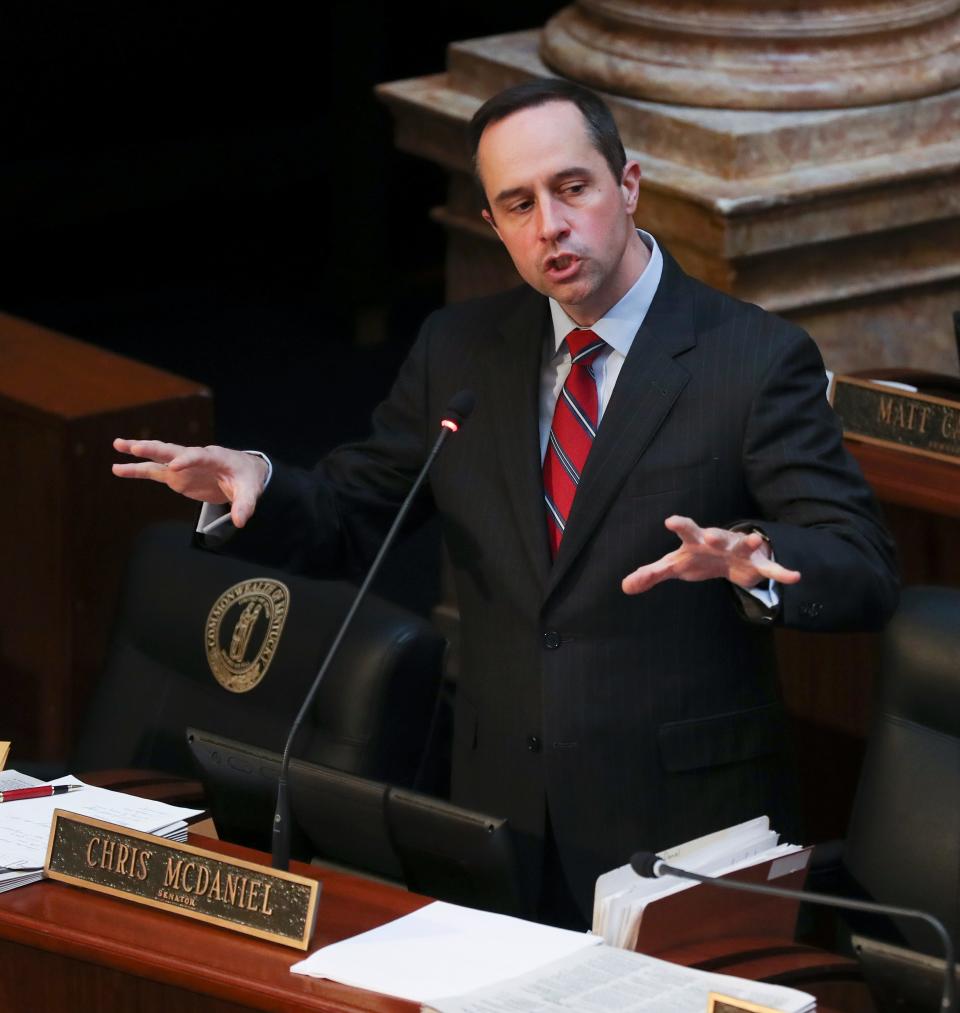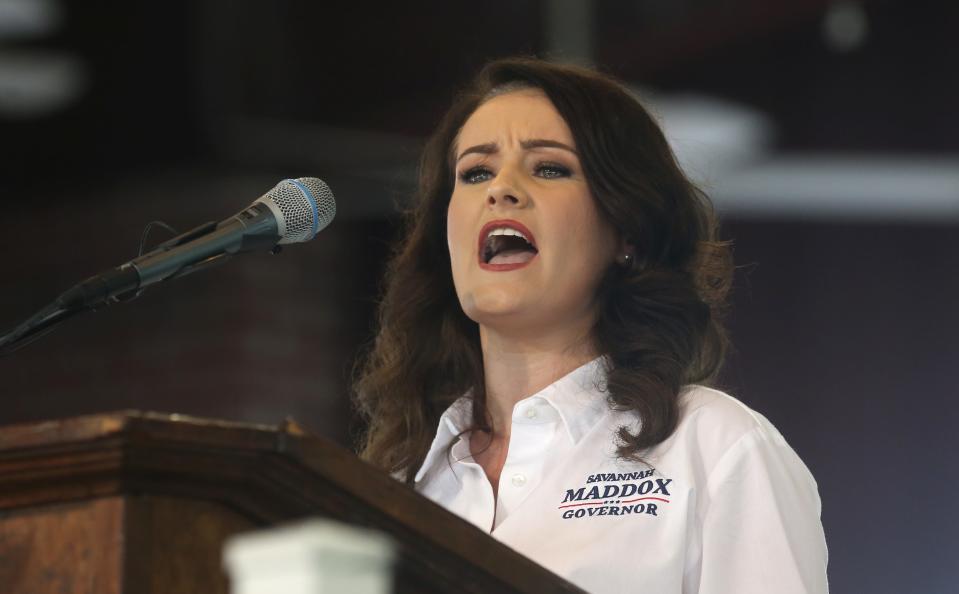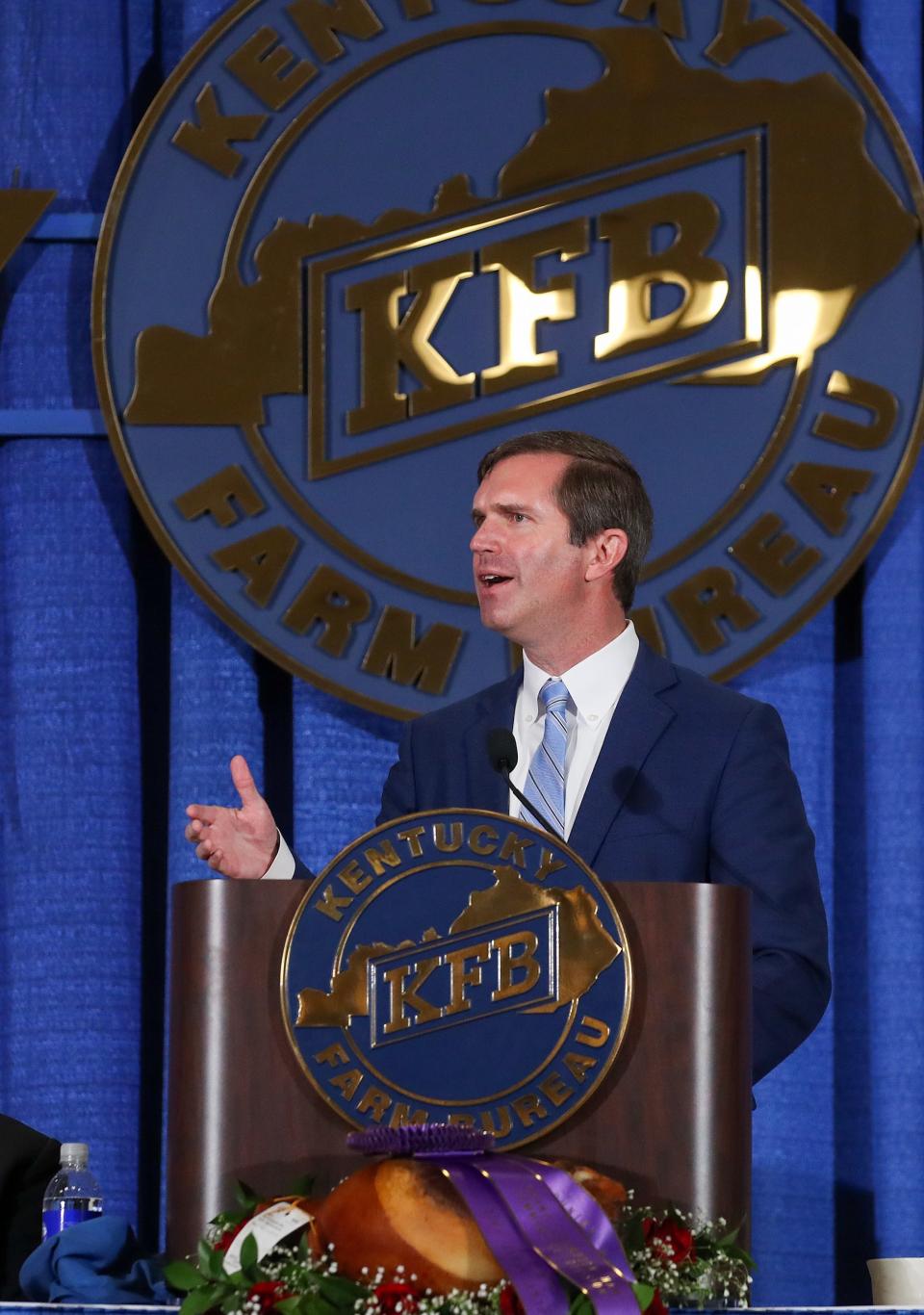Kentucky failed to hit budget triggers for another tax cut. What will lawmakers do now?

- Oops!Something went wrong.Please try again later.
The Kentucky legislature's Republican supermajority passed a landmark tax cut bill last year, seeking to incrementally lower the state's individual income tax rate until it reaches zero — as long as certain revenue, spending and budget reserve triggers are met.
While those triggers were met last summer and approved by the Kentucky General Assembly in January to lower the income tax rate from 4.5% to 4% beginning in 2024, the road to the elimination of the tax ran into its first hiccup last month.
In an Aug. 14 letter to the chairmen of the legislative budget committees, state budget director John Hicks informed them the triggers were not met in the recently ended fiscal year — meaning there would be no decrease of the income tax rate to 3.5% in 2025.
The failure of the state to meet the budget triggers for the next round of tax cuts under the 2022 bill comes months ahead of lawmakers returning to Frankfort in January for the next legislative session, in which they will craft and pass a budget bill outlining state spending and revenue for the next two fiscal years.
Here's a look at why the tax cut triggers were not met this year, steps the Republican supermajority may take in the next session to ensure the triggers are met in future years and how the issue may intersect with the current race for governor:
A $435 million gap foils trigger
House Bill 8, passed in the 2022 session, sets up processes for Kentucky's individual income tax rate to drop .5% each year, as long as:
The budget reserve trust fund (also known as rainy day fund) amounts to at least 10% of the total General Fund tax revenue at the end of a fiscal year;
General Fund tax revenue must exceed General Fund spending by at least the amount of revenue that would be lost by cutting the tax rate a full percentage point.
While the first trigger was met in the fiscal year ending June 30 — with the record budget reserve fund of $3.7 billion nearing 25% of revenue — the second trigger was not.
A 1% reduction of the income tax would have lowered revenue by $1.2 billion that fiscal year, and when added with the $14.3 billion of General Fund appropriations, it amounted to nearly $435 million more than the $15.1 billion of General Fund revenue.
Unlike last summer — when revenue was greater and triggered the tax rate reduction to 4% in 2024 — this $435 million gap means there will be no reduction to 3.5% in 2025 under the HB 8 system.
\'Working precisely as intended\'
While the Republican architects of HB 8 hoped Kentucky would be able to reduce its income tax rate to zero as soon as possible, the chairmen of both the House and Senate budget committees did not sound the alarm at the announcement the triggers weren't met, instead saying the system worked just as it was designed to work.
Rep. Jason Petrie, R-Elkton, the chair of the house budget committee, issued a statement explaining the trigger system of HB 8 "is working," as it was carefully and methodically crafted to "exercise an abundance of caution and ensure that we are successful in eliminating the tax without endangering necessary government services."
Democratic and left-leaning critics of HB 8 — as well as House Bill 1 passed this year, formally lowering the rate in 2024 — said it was a risky plan to shift temporary revenue spikes into permanent tax cuts, which could lead to vital government services being starved of appropriations in future years.

Sen. Chris McDaniel, R-Taylor Mill, who chairs the budget committee of his chamber, likewise indicated in a statement that HB 8 "is working precisely as intended," countering the naysayers by arguing the failure to hit the trigger "is evidence we appropriately weighed the importance of lowering taxes with the need for critical government functions such as education, corrections, and more."
Though Democratic Gov. Andy Beshear vetoed HB 8 — saying at the time he did so because the bill expanded the sales tax to new services — he said last week the legislature "tried to put together what they believed was a responsible framework."
Beshear — who signed HB 1 this year to cut the tax rate to 4% — added that Kentuckians should not be worried about the tax cut triggers not being met this summer, as "we have a booming economy," and July revenues were greater than that month last year, even with a reduced income tax.
A trigger adjustment or spending cuts?
McDaniel told The Courier Journal this week that he was not very surprised the tax cut triggers weren't met this year, considering the number of weather emergencies they had to deal with of late, saying it's not a reason for panic.
But will some Republican legislators push to weaken the budget thresholds of HB 8, making it easier for tax cuts to be triggered?
McDaniel says while "some folks may throw that out there," he does not envision that happening,
"We worked pretty hard to get where we got with the final product that was passed back several years ago, so I don't think you'll see that."
Rep. Savannah Maddox, R-Dry Ridge, perhaps the largest fiscal hawk in her caucus, was also not surprised the triggers weren't met, saying it was because legislators "have yet to restrain spending in the way that we should."
Maddox noted that she was one of only two Republicans to vote against HB 8, as "we are not going to be able to enact substantive tax reform unless we're willing to make meaningful spending cuts."

"I know that there are folks within the supermajority who are saying that the bill is working as it was designed to work, and on that point I would agree with them — but I disagree with the premise, if we're really wanting to cut the income tax and get it to zero."
Though not aware of any talk among Republicans about weakening the triggers, Maddox added that as they prepare a new two-year budget for the next session, "what we should be talking about is that we have to cut spending in order to be able to meet those triggers sooner."
Maddox said she's already hearing talk from Republicans "about how there won't be spending cuts" in the upcoming budget, "maybe just freezes and things like that" — which she finds insufficient.
"Whenever we're contemplating the budget, no longer do we have the luxury of prioritizing wants alongside of needs," Maddox said. "We have to prioritize needs over wants."
McDaniel said there is likely be a greater emphasis on spending restraint in the upcoming budget to help facilitate future tax cuts, as that was one of the bill's intentions.
"Instead of just thinking about how do we allocate every growth dollar in the economy, (HB 8) forces a decision of: Do we allocate the dollars into government, or do we restrain from spending those dollars so that they can be returned to taxpayers?" McDaniel said. "It adds a new dimension to the overall budget negotiation, and I think this will be the first time that we've really had to engage in that conversation."
While McDaniel would like to see Kentucky eliminate the income tax "sooner rather than later," he added that "we would like to be there responsibly."
"We believe that there is a solid conservative case to be made for lowering these tax rates and we aren't going to make it if in the interim we do a bunch of damage elsewhere... A longer term discipline is better than a quick desired outcome."
Governor candidates differ on 0% income tax

Beshear is running for reelection in a competitive race this fall against Republican Attorney General Daniel Cameron, who said last week at a campaign event that "I will be the governor who eliminates the income tax."
While Cameron said he will "work hard to make sure that we get to zero as quickly as we possibly can," his campaign did not directly answer questions asking if he would support weakening the triggers in HB 8 or another standalone bill to speed up that process.
"Andy Beshear is committed to Bidenomics and higher income taxes," said Cameron campaign spokeswoman Courtney Norris. "When Joe Biden inflicted historic inflation on working families, Andy Beshear vetoed an income tax cut for Kentuckians. (Cameron) will get rid of it."

If Kentucky is able to hit the tax cut triggers under HB 8 in each subsequent year, the earliest the individual income tax could be eliminated is 2033 — which is more than a year after Cameron would leave office, should he be elected, reelected and serve two full terms.
Though Beshear signed HB 1 into law this year to lower the income tax to 4%, he criticized Cameron's plan for a 0% rate at his press conference last week, saying that "would require a massive increase in the sales tax, and likely inclusion of food and medicine in it."
"You cannot go to 0% income tax, like Daniel Cameron has pushed, without either a massive sales tax increase —which is what he would do — or the gutting of K-12 education, higher education and healthcare coverage for millions of Kentuckians," Beshear said.
Reach reporter Joe Sonka at jsonka@courierjournal.com and follow him on Twitter at @joesonka.
This article originally appeared on Louisville Courier Journal: Kentucky failed to hit budget triggers for another income tax cut.

